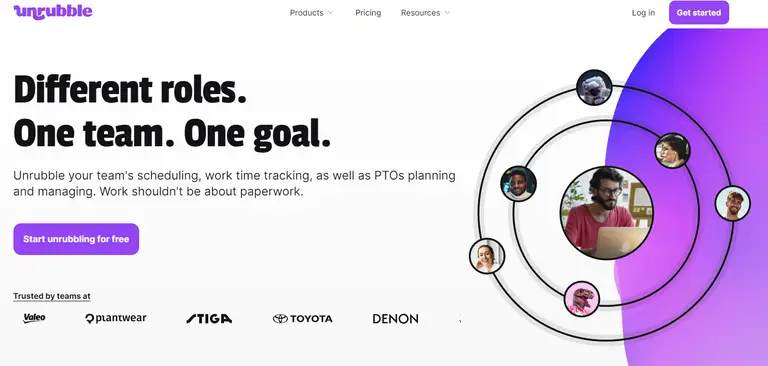Tick, tock, tick, tock ⏰... and just like that, the hands of the clock turn into an 80-hour work week.
Welcome to the world where overachievement meets exhaustion, and caffeine is the currency of choice.
In this article, we dive headfirst into the eccentricity of the 80-hour work week.
Let's unveil the secrets and uncover the madness behind the 80-hour work week.
Can it work? Is it healthy? Is it legal? Find out below.
What is an 80-hour workweek?
An 80-hour work week refers to a work schedule where an individual is expected to work for 80 hours within a single week.
This typically involves working for extended periods each day, including weekends, resulting in a significantly higher workload than the standard 40-hour work week.
What does an 80 hour work week schedule look like?
An 80-hour work week schedule can vary depending on the specific job and industry.
However, here is an example of how an 80-hour work week might be structured:
Monday to Friday:
Start work at 8:00 AM and work until 8:00 PM (12 hours).
Take short breaks for meals and rest during the day, typically not exceeding one hour in total.
Repeat the same schedule for each day of the workweek, totaling 60 hours.
Saturday and Sunday:
Work from 8:00 AM to 6:00 PM (10 hours) on both days
Who works 80 hours per week?
While it is not common or recommended for most industries, there are a few professions or roles where 80-hour work weeks may occur.
It happens usually as a result of specific job demands or circumstances.
Here are a few examples:
Entrepreneurship, startups, business owners
Serial entrepreneurs and successful people often dedicate extensive hours and personal lives to building and growing their businesses.
Due to the high level of responsibility and the need to handle multiple aspects of the company's operations, they may find themselves working long hours to meet deadlines and ensure business success.
🔍Example:
Monday to Friday:
- Business operations and management: 10 hours per day x 5 days = 50 hours
- Strategic planning and goal setting: 4 hours per day x 5 days = 20 hours
Saturday and Sunday:
- Networking, business development, and rest: 5 hours per day x 2 days = 10 hours
Total: 80 hours

Medicine and healthcare
Medical professionals often work long hours.
Examples include doctors and residents, particularly those in demanding specialties like surgery, emergency medicine, or critical care.
While regulations have been implemented in many countries to limit excessive work hours, healthcare workers may still experience extended shifts and irregular schedules during intense periods or emergencies.
🔍Example:
Monday to Friday:
- Hospital shifts: 10 hours per day x 5 days = 50 hours
- Administrative tasks and patient follow-ups: 1 hour per day x 5 days = 5 hours
- Continuing Medical Education (CME) activities and research: 1 hour per day x 5 days = 5 hours
Saturday and Sunday:
- On-call duties at the hospital: 12 hours per day x 2 days = 24 hours
Total: 84 hours

Investment Banking and Finance
Professionals in the finance sector, especially those working in investment banking, private equity, or hedge funds, are known for their demanding work schedules.
During busy periods, such as mergers and acquisitions or financial market fluctuations, employees may be required to work long hours to meet deadlines and handle complex transactions.
🔍Example:
Monday to Friday:
- Deal analysis and financial modeling: 10 hours per day x 5 days = 50 hours
- Client meetings and presentations: 2 hours per day x 5 days = 10 hours
- Research and market analysis: 2 hours per day x 5 days = 10 hours
Saturday and Sunday:
- Review and preparation: 4 hours per day x 2 days = 8 hours
Total: 78 hours

Legal Services
Lawyers, particularly those in large law firms or involved in high-stakes cases, can have demanding work schedules.
The preparation for trials, negotiations, and legal research can result in long hours, especially when dealing with time-sensitive matters.
🔍Example:
Monday to Friday:
- Client meetings and consultations: 8 hours per day x 5 days = 40 hours
- Legal research and case preparation: 8 hours per day x 5 days = 40 hours
Saturday and Sunday:
- Document drafting and administrative tasks: 2 hours per day x 2 days = 4 hours
Total: 84 hours

It's important to note that some industries may occasionally require or experience 80-hour work weeks.
Nevertheless, there is growing recognition of the importance of work-life balance and the negative effects of prolonged work hours on well-being and productivity.
Labor laws and regulations in many countries aim to protect employees from excessive work hours and promote healthier work environments.
Is an 80-hour week healthy?
Working 80 hours per week is generally considered unhealthy and unsustainable for an extended period of time.
Here are some reasons why:
Physical health
Long work hours can lead to physical exhaustion and increased stress on the body. Lack of proper rest and sleep can do lots of damage.
Imagine things like an impaired immune system, increased risk of heart disease and stroke, higher rates of fatigue, injuries, and various types of pain.
Mental health
Working excessively long hours can have a detrimental impact on mental health care.
It can contribute to increased stress, anxiety, depression, and burnout.
It leaves little time for relaxation, leisure activities, and self-care, which are essential for keeping overall well-being.
Work-life balance
An 80-hour work week leaves little time for personal relationships, hobbies, and activities outside of work.
This imbalance can strain relationships, lead to social isolation, and hinder personal growth and fulfillment.
Productivity and performance
While working long hours may seem productive in the short term, prolonged work hours can actually diminish productivity and impair decision-making abilities.
Fatigue and burnout can reduce focus, creativity, and problem-solving skills, ultimately leading to decreased overall performance.
Quality of work
Exhaustion and lack of sufficient rest can compromise the quality of work.
Errors, mistakes, and poor judgment can occur when individuals are mentally and physically drained.
This can potentially lead to negative consequences in certain professions such as healthcare, finance, or legal services.
Is working 80 hours per week legal?
The legality of working an 80-hour work week depends on the country and its labor laws.
Many countries have regulations in place to protect employees from excessive work hours and to promote a healthy work-life balance.
These regulations typically include provisions such as maximum weekly working hours, mandatory rest periods, and overtime compensation.
For example, in the United States, the Fair Labor Standards Act (FLSA) establishes a standard 40-hour workweek for non-exempt employees.
It requires employers to pay overtime at a rate of 1.5 times the regular pay for any hours worked beyond 40 in a week.
However, there are exceptions and exemptions for certain industries and job roles.
In various countries, including those in the European Union, there are often stricter regulations regarding working hours.
Those include limits on weekly hours, mandatory breaks, and requirements for paid annual leave.
Tips for surviving 80 hour work weeks
While working 80 hours per week isn’t recommended, sometimes you just can’t avoid it.
For times like those, we’ve prepared a handful of tips to keep you on top of your form.
Remember about them next time you have to work extremely long hours.
Take frequent breaks and get rest
Taking care of yourself is crucial during extended work weeks. Make sure you get enough sleep each night to rejuvenate your body and mind.
Create a consistent sleep schedule and establish a bedtime routine to promote better sleep quality. Also, take frequent breaks to avoid burnout.
💡 Practical tip: go to sleep and wake up every day at the same time to build a healthy sleep schedule
Track your time for maximum efficiency
Time management becomes even more critical when you have a heavy workload.
Use time tracking apps like Unrubble or techniques like the pomodoro technique to break your work into focused time intervals, balancing intense work with short breaks.

Unrubble will help you track your time in an effective way. Use it if you want to:
All of that can be done from desktop devices or from the comfort of your mobile phone - thanks to our mobile app.
With Unrubble, you’ll build healthy working habits quickly. No more overworking yourself or losing track of time.
💡 Practical tip: use Unrubble for easy and effective work time tracking and management of your and your employees’ work

Get some exercise throughout your workday
Regular exercise is vital for your physical and mental well-being.
Find time during your workday for some physical activity, whether it's a quick workout, stretching, or even a short walk.
Physical activity can boost your energy levels and improve your overall mood.
💡 Practical tip: take advantage of helpful YouTube 5 or 10-minute workouts you can do from your office chair.
Socialize with others whenever possible
Spending long hours at work can be isolating, so make an effort to socialize with colleagues whenever possible. You can also leverage membership management here.
Engage in conversations during breaks or lunchtime. Social interaction can help relieve stress, foster a sense of camaraderie, and provide support.
💡 Practical tip: plan your social meetings in advance to avoid the chance of missing out on them because of work.
Set aside time for meals
When working long hours, it's easy to neglect healthy eating habits.
Plan and prepare your meals in advance to ensure you have nutritious options readily available.
Avoid relying on unhealthy snacks or fast food as a primary source of sustenance.
Don’t forget about water either. Proper hydration is essential for maintaining focus and energy levels.
Keep a water bottle at your workstation and make a conscious effort to drink enough water throughout the day.
💡 Practical tip: try meal prepping in advance so that you don’t have to spend many hours during the week on cooking
Balancing Extended Work Hours with Physical and Mental Health
Managing physical and mental health is crucial, especially for those working such long hours. Extended work hours can lead to various challenges, but with the right strategies, you can maintain a healthy balance.
Impact on Physical Health:
- Physical Health Problems: Working more hours than the standard can lead to physical health problems such as fatigue, back pain, and increased stress levels.
- All Your Meals: Ensure you have balanced nutrition by not skipping any meals, even when working long shifts. This helps in maintaining energy levels and overall health.
Impact on Mental Health:
- Mental Health: Long work hours can also impact your mental health, leading to stress, anxiety, and burnout. It’s essential to take proactive steps to manage these effects.
- Night Routine: Establishing a night routine can help signal your body that it’s time to wind down, improving sleep quality and mental well-being.
Tips for Maintaining Health:
- Track Your Hours: Use a time tracking app to monitor how many hours you work each week. This can help you stay within healthy limits and ensure you allocate time for rest and leisure.
- Spending Quality Time: Prioritize spending quality time with family and friends during your off hours to enhance your mental health.
- Leisure Time: Make the most of your leisure time by engaging in activities that you enjoy and that help you relax.
Work-Life Balance Strategies:
- Supervisory Board Member: If you hold a demanding position like a supervisory board member, it’s crucial to delegate tasks and manage your workload effectively.
- Morning Person vs. Night Owl: Whether you are a morning person or prefer late hours, align your work schedule with your natural rhythms to boost productivity and well-being.
- Extended Work Hours: If you must work extended work hours, ensure you take regular breaks and schedule time for physical activities to mitigate health risks.
Conclusion:
Balancing physical and mental health with work demands requires intentional effort and strategic planning. By tracking your work hours, establishing routines, and prioritizing health and leisure, you can mitigate the negative effects of extended work hours and maintain a healthier lifestyle.
Wrapping up
With our top tips, you can say goodbye to the frenzy of overworking yourself to deadly extents.
If, however, sometimes you just have to work more than usual, think about Unrubble.
Unrubble is here to save the day with its intuitive time tracking and management features.
So, why settle for being buried in work when you can conquer it with style and efficiency?
Take charge of your workweek and reclaim your time by giving Unrubble a try!
BONUS: Are you working too many hours in a week? Questions to ask yourself
If most of the answers to these questions are "yes", then you should consider slowing down with the amount of work you're doing.
- Are you consistently sacrificing hours of sleep to meet work demands, jeopardizing your well-being and leaving you feeling exhausted?
- Is your mental health affected by the prolonged periods of time spent on work-related tasks without ample breaks or leisure time to recharge?
- Have you noticed any negative impacts on your physical health, such as increased stress levels, decreased immune function, or chronic health issues due to excessive work hours?
- Are you finding it difficult to maintain a healthy work-life balance, consistently prioritizing your professional life over personal time and non-work activities?
- Do you find yourself regularly working extra hours week after week, pushing the boundaries of what is considered a reasonable amount of time for work?
- Have you experienced extreme workweeks, such as 100-hour weeks, where the toll on your well-being and productivity becomes evident?
- Are you able to allocate a reasonable amount of time for self-care, hobbies, and activities that bring you joy outside of your daily work schedule?
- How often do you find yourself compromising your health and well-being to accommodate the demands of your professional life?
- Are you frequently neglecting important non-work activities and personal commitments due to an overwhelming workload?
- Have you taken a step back to assess whether your daily schedule aligns with your overall health and happiness, or is it dominated by work-related tasks?
FAQ
Is working 80 hours a week okay?
Working 80 hours a week is generally not recommended as it can lead to physical and mental health problems, including chronic sleep deprivation and a significant imbalance in personal life.
How long is 80 hours in a work week?
80 hours in a work week doubles the average work week of 40 hours, significantly reducing time for non work related activities and leisure time.
How many 8 hour days is 80 hours?
80 hours equates to ten 8-hour days, indicating a schedule that far exceeds normal working hours and likely impacts mental health and physical health.
Is it possible to work 120 hours a week?
While physically possible, working 120 hours a week is extremely risky and unsustainable as it leads to severe sleep deprivation and neglect of healthy habits.
Is working 100 hours a week possible?
Working 100 hours a week, though possible, is highly inadvisable as it involves such extreme hours that can cause serious damage to mental and physical health.
Can I work 80 hours a week in the UK?
In the UK, working 80 hours a week regularly may conflict with certain legal standards for work hours and is generally discouraged due to the negative effects on mental and physical health.
Is 80 hours biweekly?
Working 80 hours biweekly averages to 40 hours per week, aligning more closely with a better work-life balance and allowing more time for leisure and personal activities.








